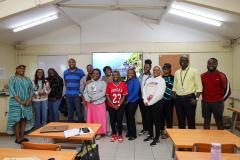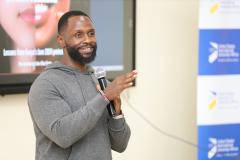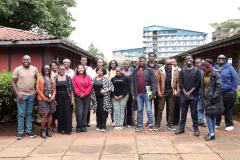Content Creator Mastery Bootcamp
Bootcamp Overview:
The Content Creation Bootcamp is a 5-day intensive training program designed to equip participants with the practical skills needed to create high-quality content in the areas of Photography, Videography, Mobile Journalism, Podcasting, and Radio. The bootcamp focuses on hands-on experience, providing participants with the tools, techniques, and strategies to excel in various content creation fields. Through a combination of theoretical knowledge and practical exercises, participants will learn to produce professional-grade content that resonates with audiences across different platforms.
This bootcamp is ideal for:
Aspiring Content Creators: Individuals looking to build or enhance their skills in multimedia content creation.
Journalists and Media Professionals: Those wishing to adapt to digital media trends and learn new content creation techniques.
Entrepreneurs and Influencers: People wanting to develop their personal brand and create engaging content for social media platforms.
Students and Graduates: Those pursuing a career in media, communications, or digital marketing, and seeking to gain hands-on experience in content creation.
Corporate Teams and Marketing Professionals: Teams looking to expand their digital marketing and media production capabilities.
Training Methods:
The bootcamp will employ a combination of the following training methods:
Interactive Lectures: Brief, engaging presentations introducing key concepts and theories.
Hands-on Practical Sessions: Participants will engage in real-world exercises to apply the knowledge gained in each session. This includes photography and video shoots, mobile journalism assignments, podcast recordings, and radio productions.
Group Work and Collaboration: Encouraging peer-to-peer learning, participants will collaborate on content creation projects, providing each other with feedback and refining their skills.
Expert Demonstrations: Industry professionals will offer demonstrations and tips to enhance technical proficiency and creative techniques.
Feedback and Critique Sessions: Constructive feedback will be provided during individual and group reviews, allowing participants to identify areas for improvement and celebrate successes.
Requirements:
To ensure participants can fully benefit from the bootcamp, the following requirements are recommended:
Basic Knowledge of Media: While the bootcamp is open to beginners, some basic understanding of media production (such as familiarity with smartphones or basic photography) is advantageous.
Equipment: Participants could bring their own cameras (DSLR, mirrorless, or smartphone) for photography and videography sessions. Mobile phones will be essential for the Mobile Journalism segment. A microphone and headphones are recommended for podcasting and radio production.
Laptop/Tablet: A laptop or tablet is recommended for video editing, podcast editing, and online research. Participants should have access to basic editing software (e.g., Adobe Premiere Pro, Audacity, or similar free tools) installed on their devices.
Internet Access: Basic internet access will be needed for research, content publishing, and use of online editing tools during the bootcamp.
Willingness to Learn and Collaborate: Participants should come prepared to actively engage in both solo and group tasks, share ideas, and be open to receiving feedback.
By the end of the bootcamp, participants will have created a portfolio of diverse content across multiple mediums and be equipped with the skills necessary to thrive in the fast-evolving world of content creation.
Day 1: Introduction to Content Creation & Photography Basics
Session 1: Bootcamp Introduction and Goals (9:00 AM – 10:00 AM)
This opening session sets the stage for the Bootcamp by providing an overview of the course structure and objectives. Participants will gain an understanding of the topics to be covered, including photography, videography, mobile journalism, podcasting, and radio. The session will include introductions, a group ice-breaker activity to foster collaboration, and a discussion on the significance of content creation in today's digital world.
- Overview of the bootcamp goals, schedule, and expected outcomes.
- Brief introduction to the five content creation fields.
- Group ice-breaker activity to encourage networking and collaboration.
Tea Break (10:00 PM – 10:15 PM)
Session 2: Photography Basics (10:15 AM – 12:30 PM)
This session introduces the fundamentals of photography, covering key camera types and their features (DSLR, Mirrorless, and Smartphone cameras). Participants will learn about essential photography techniques, such as composition (rule of thirds, framing), camera settings (shutter speed, aperture, ISO), and the importance of lighting. A hands-on practical session will allow participants to practice capturing images, with a focus on understanding technical settings and framing.
- Understanding camera types: DSLR, Mirrorless, and Smartphone cameras.
- Composition techniques (rule of thirds, framing, leading lines).
- Basic photography settings (exposure, shutter speed, aperture, ISO).
- Hands-on photography practice session: capturing objects and portraits.
Lunch Break (12:30 PM – 1:30 PM)
Session 3: Editing and Enhancing Photographs (1:30 PM – 3:00 PM)
Participants will be introduced to basic photo editing tools, such as Adobe Lightroom and Snapseed. The session will cover techniques for enhancing photographs, including color correction, adjusting exposure, cropping, and applying filters. After a brief tutorial, participants will engage in a practical exercise, editing their own photos captured earlier in the day, under guidance from the instructor.
- Introduction to photo-editing tools: Adobe Lightroom, Snapseed.
- Basic retouching: color correction, exposure adjustment, cropping, and filters.
- Practical editing session: participants edit their photos from the morning session.
Session 4: Photography Review and Critique (3:15 PM – 4:30 PM)
In this session, participants will present their edited photos to the group for feedback and constructive critique. The focus will be on improving composition, lighting, and editing techniques. Participants will also learn how to give and receive feedback, fostering a collaborative learning environment. This review will help identify areas of strength and opportunities for further development.
- Group photo review: constructive feedback on photos.
- Tips for improving photography skills.
Day 2: Videography Fundamentals
Session 1: Introduction to Videography (9:00 AM – 10:30 AM)
This session introduces the fundamentals of videography, exploring the key concepts of video production, such as framing, shot types, and camera movements. Participants will learn how to create visually appealing videos by understanding the role of camera settings (resolution, frame rate, white balance) and the impact of composition on storytelling.
- Overview of videography tools: cameras, gimbals, lighting, microphones.
- The importance of storytelling in video content.
- Key concepts: framing, shot types, and video composition.
Tea Break (10:30 PM – 10:45 PM)
Session 2: Video Production Basics (10:45 AM – 12:30 PM)
This session dives deeper into the technical aspects of videography. Participants will learn about video formats, camera settings, and techniques to capture dynamic video footage, such as using different shot types and angles. The hands-on practice will allow participants to shoot a short video, emphasizing key skills such as proper framing, capturing movement, and shooting from different perspectives.
- Understanding video formats and resolutions.
- Exploring camera settings for video: frame rate, resolution, white balance.
- Hands-on practice: shooting a short video with a focus on framing and motion.
Lunch Break (12:30 PM – 1:30 PM)
Session 3: Video Editing Essentials (1:30 PM – 3:00 PM)
Participants will be introduced to popular video editing software, such as Adobe Premiere Pro, Final Cut Pro, and DaVinci Resolve. The session will cover basic editing techniques, including cutting, transitions, color grading, and audio adjustments. After a demonstration, participants will practice editing the footage they shot earlier in the day, focusing on storytelling through editing and pacing.
- Introduction to video editing software (Adobe Premiere Pro, Final Cut Pro, DaVinci Resolve).
- Editing techniques: cutting, transitions, color grading, adding music.
- Hands-on practice editing the footage shot earlier in the day.
Session 4: Video Review and Feedback (3:15 PM – 4:30 PM)
In this session, participants will showcase their edited videos for group review. The instructor and peers will provide feedback on various aspects of the videos, including composition, pacing, audio, and visual appeal. This session will also include a discussion of best practices in videography, allowing participants to refine their techniques and prepare for future projects.
- Participants showcase their edited videos for feedback.
- Group critique and tips for improving editing skills.
Day 3: Mobile Journalism (MoJo)
Session 1: Introduction to Mobile Journalism (9:00 AM – 10:30 AM)
This session introduces the concept of mobile journalism (MoJo) and its significance in the modern media landscape. Participants will learn about the tools and apps commonly used by mobile journalists, such as phone camera settings, editing apps, and content distribution platforms. The session will emphasize the flexibility and accessibility of MoJo, and its growing importance in both traditional and digital media.
- Defining Mobile Journalism and its role in today’s media landscape.
- Essential tools and apps for mobile journalists: phone camera settings, editing apps.
- Advantages and challenges of mobile journalism.
Tea Break (10:30 PM – 10:45 PM)
Session 2: Capturing Stories on Mobile Devices (10:45 AM – 12:30 PM)
Focusing on the practical aspects of mobile journalism, this session will teach participants how to capture high-quality videos and photos using their mobile devices. The session will cover techniques for shooting interviews, B-roll footage, and capturing natural sound. Participants will engage in hands-on practice, creating a mobile journalism story by filming and interviewing participants or capturing an event.
- Best practices for capturing video and photos with mobile devices.
- Interview techniques, b-roll shooting, and sound recording.
- Hands-on exercise: mobile journalism assignment, capturing an event or interview.
Lunch Break (12:30 PM – 1:30 PM)
Session 3: Editing and Publishing on Mobile (1:30 PM – 3:00 PM)
Participants will be introduced to mobile editing tools such as InShot, Kinemaster, and Adobe Rush, which allow for quick and efficient editing of video and photo content. The session will cover techniques for editing, syncing audio, adding text, and applying effects. Participants will edit their content from the previous session and prepare it for publishing.
- Overview of mobile editing apps: InShot, Kinemaster, Adobe Rush.
- Editing and publishing tips: audio sync, text overlay, adding effects.
- Practical session: editing the content captured earlier.
Session 4: Mobile Journalism Review and Strategy (3:15 PM – 4:30 PM)
In this session, participants will present their mobile journalism stories for review. The group will discuss the challenges and advantages of mobile journalism, including tips on producing engaging, professional-quality content using mobile devices. Participants will also learn about strategies for distributing mobile journalism stories across social media platforms and news outlets.
- Group review of mobile journalism pieces.
- Discussion on how to use mobile journalism in professional media production.
Day 4: Podcasting Techniques
Session 1: Introduction to Podcasting (9:00 AM – 10:30 AM)
This session provides an introduction to the world of podcasting, including its history, growth, and impact on media. Participants will learn about the key components of a successful podcast, including format, target audience, and content planning. The session will also cover the essential equipment needed for podcast production, such as microphones, audio interfaces, and recording software.
- Understanding podcasting and its growing role in media.
- Planning your podcast: choosing topics, format, and target audience.
- Essential equipment: microphones, audio interfaces, and recording software.
Tea Break (10:30 PM – 10:45 PM)
Session 2: Recording a Podcast Episode (10:45 AM – 12:30 PM)
Participants will dive into the technical aspects of podcast recording. This session will cover microphone techniques, soundproofing, and voice control. Participants will learn how to structure their podcast episodes, including scriptwriting, pacing, and timing. During the hands-on exercise, participants will record a short podcast episode, applying the skills they’ve learned.
- Setting up the recording environment: soundproofing, microphone techniques.
- Recording your first podcast episode: scriptwriting, voice projection, pacing.
- Hands-on session: participants record a short podcast episode in pairs or small groups.
Lunch Break (12:30 PM – 1:30 PM)
Session 3: Editing and Publishing a Podcast (1:30 PM – 3:00 PM)
This session will focus on editing podcast recordings using software such as Audacity or Adobe Audition. Participants will learn how to remove background noise, improve audio quality, and create smooth transitions between segments. They will then edit their own podcast recordings from the previous session, adding music and sound effects where appropriate.
- Introduction to podcast editing software: Audacity, Adobe Audition.
- Techniques for removing background noise, adding intros/outros, and creating smooth transitions.
- Participants edit their recorded podcast segments.
Session 4: Podcast Review and Promotion (3:15 PM – 4:30 PM)
In this session, participants will listen to and provide feedback on each other’s podcast episodes. The session will cover podcast promotion strategies, including social media outreach, distribution platforms, and SEO for podcasts. Participants will leave with the knowledge to launch and promote their own podcast.
- Review and feedback on podcast episodes.
- Strategies for promoting and distributing podcasts (hosting platforms, social media, SEO).
Day 5: Radio Content Creation and Storytelling
Session 1: Introduction to Radio Production (9:00 AM – 10:30 AM)
This session will introduce the essentials of radio production, including the differences between live and pre-recorded content. Participants will learn about radio formats, such as news, talk shows, interviews, and storytelling. The session will also cover the basic radio equipment used, including microphones, audio mixers, and editing software.
- Overview of radio content creation: live vs. pre-recorded.
- The basics of scripting, voice work, and on-air presentation.
- Essential equipment for radio: microphones, soundboards, and editing tools.
Session 2: Creating Compelling Radio Content (10:45 AM – 12:30 PM)
Participants will explore how to create engaging radio content that resonates with listeners. The session will cover audience engagement techniques, scriptwriting for radio, and voice delivery. Participants will create and record a 5-minute radio segment, incorporating the storytelling techniques and formats discussed earlier
- Understanding audience engagement and tailoring content.
- Radio show formats: interviews, news, entertainment, and storytelling.
- Practical exercise: participants create and record a 5-minute radio segment.
Lunch Break (12:30 PM – 1:30 PM)
Session 3: Radio Editing and Post-Production (1:30 PM – 3:00 PM)
This session will cover the editing process for radio content, including removing mistakes, adding sound effects, and integrating music. Participants will learn how to refine their recorded radio segments, ensuring high-quality audio and a polished final product. Hands-on editing exercises will allow participants to edit their own radio content.
- Editing radio content: removing mistakes, adding sound effects, music beds.
- Hands-on session: editing and finalizing radio content created earlier in the day.
Session 4: Radio Content Review and Distribution (3:15 PM – 4:30 PM)
In this final session, participants will listen to and critique each other’s radio segments. The session will also focus on strategies for distributing radio content through various platforms, including local radio stations, podcasts, and online streaming services. Participants will leave with the knowledge of how to get their radio content to a wider audience.
- Group review of radio segments.
- Best practices for distributing radio content: local stations, podcasts, and social media.
- Closing thoughts, Q&A, and feedback on the bootcamp experience.
Bootcamp Wrap-Up (4:30 PM – 5:00 PM)
- Certificate presentation and group photo.
- Final words on continued learning and building a content creation portfolio.
- Encouragement for future collaborations and networking.
This bootcamp will provide participants with practical, hands-on experience across various content creation fields, equipping them with the tools to produce professional-quality content.
Bootcamp Wrap-Up (4:30 PM – 5:00 PM)
The bootcamp concludes with a final review of the content created throughout the week. Participants will receive certificates of completion and have the opportunity to share their feedback on the bootcamp. The session will include closing remarks and suggestions for continued learning and growth in content creation.




